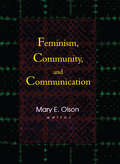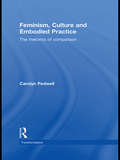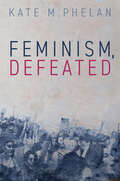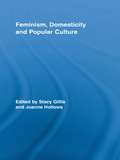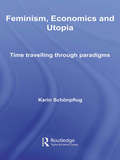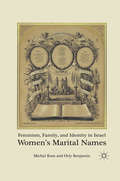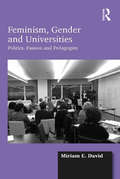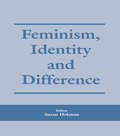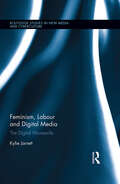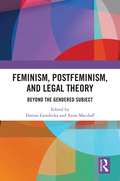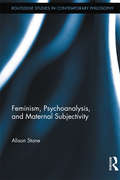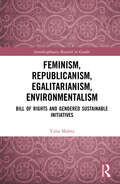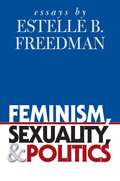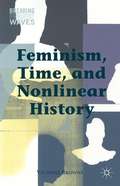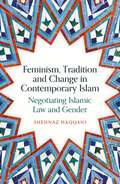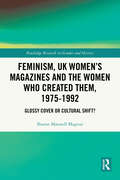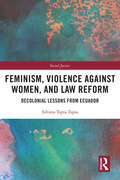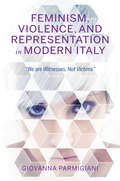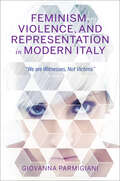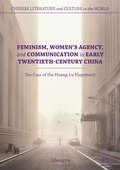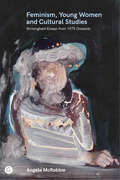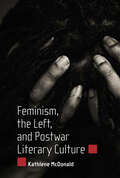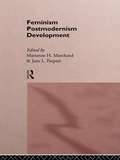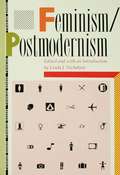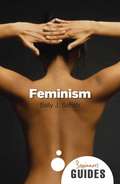- Table View
- List View
Feminism, Community, and Communication
by Betty Mackune-Karrer Mary E Olson. . . from the minds of therapists on the cutting edge!This informative, innovative collection brings together the work of a group of “scholar-therapists,” all women, who have met regularly for ten years to discuss family therapy, gender, and postmodern ideas. The major themes--feminism, community, and communication--are taken in new directions. Feminism, Community, and Communication rethinks therapy, research, teaching, and community work with a renewed emphasis on collaboration, intersubjectivity, and the process of communication as a world-making and identity-making activity. The issues of gender, culture, religion, race, and class figure prominently in this book.In Feminism, Community, and Communication you'll find descriptions of: communal perspectives for therapists that stress listening and understanding over interpreting and knowing the power of love and spirituality in relation to organizational consultation to an agency beset by racial division research on anorexia and what it means a mentoring project for rural girls the Bar/Bat Mitzva as therapy an ethnographic study of Lebanese womenFeminism, Community, and Communication takes an exciting, fresh look at these three intertwined concepts, representing a way of thinking and doing therapy, research, community work, and training that highlights the ethical dimension of each. The book takes the position that human beings are meaning-makers in a common world, and not simply objects to be scrutinized or assessed by “experts.”
Feminism, Culture and Embodied Practice: The Rhetorics of Comparison (Transformations)
by Carolyn PedwellWithin both feminist theory and popular culture, establishing similarities between embodied practices rooted in different cultural and geo-political contexts (e.g. ‘African’ female genital cutting and ‘Western’ cosmetic surgery) has become increasingly common as a means of countering cultural essentialism, ethnocentrism and racism. Feminism, Culture and Embodied Practice examines how cross cultural comparisons of embodied practices function as a rhetorical device – with particular theoretical, social and political effects - in a range of contemporary feminist texts. It asks: Why and how are cross-cultural links among these practices drawn by feminist theorists and commentators, and what do these analogies do? What knowledges, hierarchies and figurations do these comparisons produce, disrupt and/or reify in feminist theory, and how do such effects resonate within popular culture? Taking a relational web approach that focuses on unravelling the binary threads that link specific embodied practices within a wider representational community, this book highlights how we depend on and affect one another across cultural and geo-political contexts. This book is valuable reading for undergraduates, postgraduates, and researchers in Gender Studies, Postcolonial or Race Studies, Cultural and Media Studies, and other related disciplines.
Feminism, Defeated
by Kate M. PhelanFeminism has been defeated.Once a politics, feminism is now a philosophy, an epistemology, a method. Once for women, it is now for everyone. Once in pursuit of liberation, it now seeks only inclusion.In Feminism, Defeated, Kate Phelan traces the depoliticization and ultimately, the defeat of feminism. She recovers the second-wave view of men and women as sex-classes, enemies, political kinds, a view more radical than the contemporary view of men and women as social constructs. She also describes how poststructuralism displaced this view and replaced it with another. In this view, the sex/gender binary constructs men and women, and excludes the gender nonconforming.As this view replaced the second-wave one, the injustice of men’s oppression of women was replaced by that of exclusion, and the goal of women’s liberation was replaced by that of inclusion. Thus did feminism become the trans-inclusionary movement as which we now know it, and Phelan shows that this shift was not the progression of feminism; it was the betrayal of it. In this highly original and persuasive study, she argues that the recent emergence of a new gender-critical feminism presents a moment of opportunity to reclaim feminism’s political project.
Feminism, Domesticity and Popular Culture (Routledge Advances in Sociology)
by Joanne Hollows Stacy GillisThe relationship between feminism and domesticity has recently come in for renewed interest in popular culture. This collection makes an intervention into the debates surrounding feminism’s contentious relationship with domesticity and domestic femininities in popular culture. It offers an understanding of the place of domesticity in contemporary popular culture whilst considering how these domesticities might be understood from a feminist perspective. All the essays contribute to a more complex understanding of the relationships between feminism, femininity and domesticity, developing new ways of theorizing these relationships that have marked much of feminist history. Essay topics include Marguerite Patten, reality television shows like How Clean is Your House?, the figure of the maid in contemporary American cinema, aging or widowed domestic femininities, and the relationship between domesticity and motherhood.
Feminism, Economics and Utopia: Time Travelling through Paradigms (Routledge Frontiers Of Political Economy Ser.)
by Karin SchonpflugAre there feminist, economic utopian visions amongst feminist economists? What are these visions? Is there a common vision for feminist economics or should there be? Can feminist economics be effective without a utopian vision?Comprehensive and original, this book surveys the entire field of utopian literature; from Plato to the present. Answering
Feminism, Family, and Identity in Israel
by Michal Rom Orly BenjaminWomen's inner struggle over their marital names reveal how they negotiate a specific identity location in each dimension of identity. This book tackles a complex sociological project of examining three existing theories, and will prove to be important for the study of Gender and Middle Eastern Culture.
Feminism, Gender and Universities: Politics, Passion and Pedagogies
by Miriam E. DavidFeminism, Gender and Universities demonstrates the positive and robust impacts that feminism has had on higher education, through the eyes and in the words of the participants in changing political and social processes. Drawing on the ’collective biography’ of leading feminist scholars from around the world and current evidence relating to gender equality in education, this book employs methods including biographies, life histories, and narratives to show how the feminist project to transform women’s lives in the direction of gender and social equality became an educational and pedagogical one. Through careful attention to the ways in which feminism has transformed feminist academic women’s lives, the author explores the importance of education in changing socio-political contexts, raising questions about further changes that are necessary. Delving into the deeper and more ’hidden’ echelons of education, the book examines the contested nature of current managerial or business approaches to university and education, revealing these to be incompatible with feminist thought. A plea for more careful attention to education and the ways in which the processes of knowledge-making influence (and are influenced by) gender and sexual relations, Feminism, Gender and Universities will appeal to scholars across the social sciences with interests in gender, pedagogy and modern academic life.
Feminism, Identity and Difference
by Susan HekmanThis study focuses on a set of issues at the forefront of feminist thought in the late 1990s: identity, difference and their implications for feminist politics. As feminism moves into an era in which differences among women, the multiple identities of woman and identity politics are all at the centre of feminist discussions, new approaches, methods and politics are called for.
Feminism, Labour and Digital Media: The Digital Housewife (Routledge Studies in New Media and Cyberculture)
by Kylie JarrettThere is a contradiction at the heart of digital media. We use commercial platforms to express our identity, to build community and to engage politically. At the same time, our status updates, tweets, videos, photographs and music files are free content for these sites. We are also generating an almost endless supply of user data that can be mined, re-purposed and sold to advertisers. As users of the commercial web, we are socially and creatively engaged, but also labourers, exploited by the companies that provide our communication platforms. How do we reconcile these contradictions? Feminism, Labour and Digital Media argues for using the work of Marxist feminist theorists about the role of domestic work in capitalism to explore these competing dynamics of consumer labour. It uses the concept of the Digital Housewife to outline the relationship between the work we do online and the unpaid sphere of social reproduction. It demonstrates how feminist perspectives expand our critique of consumer labour in digital media. In doing so, the Digital Housewife returns feminist inquiry from the margins and places it at the heart of critical digital media analysis.
Feminism, Postfeminism and Legal Theory: Beyond the Gendered Subject?
by Dorota Gozdecka Anne MacduffThere is much debate about postfeminism, what it is, and its role in feminist politics. Whilst postfeminism has become increasingly influential in the study of literature, popular culture, and philosophy, it has so far received comparatively little attention in law. This book aims to remedy this situation. The book brings together feminist legal scholars working in different contexts to examine the idea of postfeminism and assess its contemporary relevance. It explores a range of questions including the following: Does postfeminism describe an age that follows modernism, an age where identity politics has realised its goals and feminism is no longer needed? Or does postfeminism describe the feminism of a postmodernist age where identity can mean anything at all? Or, differently again, does the term capture a ‘new feminism’ that discredits feminism and attempts to reshape its political consciousness? And what might the answers to these questions mean for law and legal theory, and a feminist politics of law reform?
Feminism, Psychoanalysis, and Maternal Subjectivity (Routledge Studies in Contemporary Philosophy)
by Alison StoneIn this book, Alison Stone develops a feminist approach to maternal subjectivity. Stone argues that in the West the self has often been understood in opposition to the maternal body, so that one must separate oneself from the mother and maternal care-givers on whom one depended in childhood to become a self or, in modernity, an autonomous subject. These assumptions make it difficult to be a mother and a subject, an autonomous creator of meaning. Insofar as mothers nonetheless strive to regain their subjectivity when their motherhood seems to have compromised it, theirs cannot be the usual kind of subjectivity premised on separation from the maternal body. Mothers are subjects of a new kind, who generate meanings and acquire agency from their position of re-immersion in the realm of maternal body relations, of bodily intimacy and dependency. Thus Stone interprets maternal subjectivity as a specific form of subjectivity that is continuous with the maternal body. Stone analyzes this form of subjectivity in terms of how the mother typically reproduces with her child her history of bodily relations with her own mother, leading to a distinctive maternal and cyclical form of lived time.
Feminism, Republicanism, Egalitarianism, Environmentalism: Bill of Rights and Gendered Sustainable Initiatives (Interdisciplinary Research in Gender)
by Yulia MaletaThis book addresses hegemonic ruling class masculinity and emphasized femininity within renewables organisational governance, and critiques Anglo-Celtic male privilege, as a barrier to women’s leadership participation. Primarily using the Australian socio-political context, the author considers the patriarchal control of organisations and renewables governance, and argues that women-led emphasized femininity-resistance strategies can challenge the hegemonic status of ruling elites to create a leadership that is less power oriented, more collaborative and open to change. Utilising detailed interviews with Australian women environmentalists, together with feminist, sociological and social movement theory, whilst considering the historic context of Red Vienna and contemporary political challenges (Brexit, Monarchism etc.), it puts forward an innovative policy framework for an Australian Bill of Rights Act and republican constitutional change. Written for academics, activists and policymakers alike, this book offers a unique insight into women’s inequity within patriarchal institutionalist governance. It will be engaging and inspiring reading for feminist and environmentalist activists and practitioners, in addition to professional associations focussing on gender, justice and environmental change. Academics and postgraduates in Gender Studies, Ecofeminism, Sociology and Organisational Studies will also find the book of key interest in its interdisciplinary discussions of Sustainable Scientific-Technological Development Initiatives (SSTDI) and feminism in an Australian political context.
Feminism, Sexuality, and Politics
by Estelle B. FreedmanOne of a small group of feminist pioneers in the historical profession, Estelle B. Freedman teaches and writes about women's history with a passion informed by her feminist values. Over the past thirty years, she has produced a body of work in which scholarship and politics have never been mutually exclusive. This collection brings together eleven essays--eight previously published and three new--that document the evolving relationship between academic feminism and political feminism as Freedman has studied and lived it.Following an introduction that presents a map of the personal and intellectual trajectory of Freedman's work, the first section of essays, on the origins and strategies of women's activism in U.S. history, reiterates the importance of valuing women in a society that has long devalued their contributions. The second section, on the maintenance of sexual boundaries, explores the malleability of both sexual identities and sexual politics. Underlying the collection is an inquiry into the changing meanings of gender, sexuality, and politics during the nineteenth and twentieth centuries along with a concern for applying the insights of women's history broadly, from the classroom to the courthouse.
Feminism, Time, and Nonlinear History
by Victoria BrowneInterweaving phenomenological, hermeneutical, and sociopolitical analyses, this book considers the ways in which feminists conceptualize and produce the temporalities of feminism, including the time of the trace, narrative time, calendar time, and generational time.
Feminism, Tradition and Change in Contemporary Islam: Negotiating Islamic Law and Gender
by Shehnaz HaqqaniThe Islamic tradition has always been flexible, changing over time and constantly adapting to the different societies Muslims find themselves in. Few Muslims today would abide by the fatwa against the printing press under the Ottomans. Moreover, although Islamic law legislates for slavery and child marriage, only a vanishing minority of Muslims consider these practices acceptable today – and some will even argue that Islam never permitted them. Yet some issues, like the prohibition on female-led prayer and female interfaith marriage seem curiously impervious to change. Why is that? Through a mixture of interviews with ordinary Muslims in Texas and critical analysis of contemporary and historical scholarship, Shehnaz Haqqani demonstrates the gendered dimensions of change and negotiation in Islamic tradition. She argues that a reliance on a mostly-male scholarly consensus means that the &‘tradition&’ preserves male privilege at the expense of justice for Muslim women.
Feminism, UK Women’s Magazines and the Women who Created Them, 1975-1992: Glossy Cover or Cultural Shift? (Routledge Research in Gender and History)
by Sharon Maxwell MagnusThis book analyses how reproductive rights and sexual freedoms, the political sphere, women’s role in the workplace and sexual violence were positioned and depicted by three magazines with very different demographics: Spare Rib, Cosmopolitan and Woman’s Own. The 1970s and 1980s were a time of enormous cultural shifts for women: The rise of the feminist Women’s Liberation Movement, ground-breaking equality legislation and greater reproductive freedoms impacted on most women’s lives in a plethora of ways. However, until now there has been little attention to how those changes were disseminated to and framed within women’s media. This is because most media of the period were run by men, for men and focused on men’s lives. However, within women’s magazines, the changes in women’s lives and feminism itself were framed, debated and contested. This volume features unique interviews with the influential women who produced the magazines (Spare Rib, Cosmopolitan and Woman’s Own) and who give insights into the national and international events, ideologies and constraints which impacted on their content creation.This book will be of great value to contemporary historians, students of gender and cultural studies, media scholars and those who are interested in finding out how feminism influenced their parents’ and their own generation.
Feminism, Violence Against Women, and Law Reform: Decolonial Lessons from Ecuador (Social Justice)
by Silvana Tapia TapiaOffering an important addition to existing critiques of governance feminism and carceral expansion based mainly on experiences from the Global North, this book critically addresses feminist law reform on violence against women, from a decolonial perspective. Challenging the consensus that penal expansion is mainly associated with the co-option of feminist campaigns to counteract violence against women in the context of neoliberal globalisation, this book shows that long-standing colonial narratives underlie many of today’s dominant legal discourses justifying criminalisation, even in countries whose governments have called themselves "leftist" and "post-neoliberal". Mapping the history of law reform on violence against women in Ecuador, the book reveals how the conciliation between feminist campaigns and criminalisation strategies takes place through liberal legality, the language of human rights, and the discourse of constitutional guarantees, across the political spectrum. Whilst human rights make violence against women intelligible in mainstream legal terms, the book shows that the emergence of a "rights-based penality" produces a benign, formally innocuous criminal law, which can be presented as progressive, but in practice reproduces colonial and postcolonial paradigms that limit and reshape feminist demands. The book raises new questions on the complex social and political factors that impact on feminist law reform projects, as it demonstrates how colonial assumptions about gender, race, class, and the family remain embedded in liberal criminal law. This theoretically and empirically informed analysis makes an innovative contribution to feminist legal theory, post-colonial studies, and criminal law; and will be of interest to activists, scholars and policymakers working at the intersections between gender equality, law, and violence in Latin America and beyond.
Feminism, Violence, and Representation in Modern Italy: "We are Witnesses, Not Victims" (New Anthropologies of Europe)
by Giovanna ParmigianiCan the way a word is used give legitimacy to a political movement? Feminism, Violence, and Representation in Modern Italy traces the use of the word "femminicidio" (or "femicide") as a tool to mobilize Italian feminists, particularly the Union of Women in Italy (UDI). Based on nearly two years of fieldwork among feminist activists, Giovanna Parmigiani takes a broad look at the many ways in which violence inflects the lives of women in Italy. From unchallenged gendered grammar rules to the representation of women as victims, Parmigiani examines the devaluing of women’s contribution to their communities through the words and experiences of the women she interviews. She describes the first uses of the word "femminicidio" as a political term used by and within feminist circles and traces its spread to ultimate legitimization and national relevance. The word redefined women as a political subject by building an imagined community of potentially violated women. In doing so, it challenged Italians to consider the status of women in Italian society, and to make this status a matter of public debate. It also problematized the connection between women and tropes of women as objects of suffering and victimhood. Parmigiani considers this exchange within the context of Italian Catholic heritage, a precarious economy, and long-held notions of honor and shame. Parmigiani provides a careful and searing consideration of the ways in which representations of violence and the politics of this representation are shaping the future of women in Italy and beyond.
Feminism, Violence, and Representation in Modern Italy: "We are Witnesses, Not Victims" (New Anthropologies of Europe)
by Giovanna ParmigianiA study of how violence and language affect women in Italy.Can the way a word is used give legitimacy to a political movement? Feminism, Violence, and Representation in Modern Italy traces the use of the word “femminicidio” (or “femicide”) as a tool to mobilize Italian feminists, particularly the Union of Women in Italy (UDI). Based on nearly two years of fieldwork among feminist activists, Giovanna Parmigiani takes a broad look at the many ways in which violence inflects the lives of women in Italy. From unchallenged gendered grammar rules to the representation of women as victims, Parmigiani examines the devaluing of women’s contribution to their communities through the words and experiences of the women she interviews. She describes the first uses of the word “femminicidio” as a political term used by and within feminist circles and traces its spread to ultimate legitimization and national relevance. The word redefined women as a political subject by building an imagined community of potentially violated women. In doing so, it challenged Italians to consider the status of women in Italian society, and to make this status a matter of public debate. It also problematized the connection between women and tropes of women as objects of suffering and victimhood. Parmigiani considers this exchange within the context of Italian Catholic heritage, a precarious economy, and long-held notions of honor and shame. Parmigiani provides a careful and searing consideration of the ways in which representations of violence and the politics of this representation are shaping the future of women in Italy and beyond.
Feminism, Women's Agency, and Communication in Early Twentieth-Century China: The Case of the Huang-Lu Elopement (Chinese Literature and Culture in the World)
by Qiliang HeFeminism, Women’s Agency, and Communication in Early Twentieth-Century China focuses on a sensational elopement in the Yangzi Delta in the late 1920s to explore how middle- and lower-class members of society gained access to and appropriated otherwise alien and abstract enlightenment theories and idioms about love, marriage, and family. Via a network of communications that connected people of differing socioeconomic and educational backgrounds, non-elite women were empowered to display their new womanhood and thereby exercise their self-activating agency to mount resistance to China’s patriarchal system. Qiliang He’s text also investigates the proliferation of anti-feminist conservatisms in legal practice, scholarly discourses, media, and popular culture in the early Nanjing Decade (1927-1937). Utilizing a framework of interdisciplinary scholarship, this book traverses various fields such as legal history, women’s history, popular culture/media studies, and literary studies to explore urban discourse and communication in 1920s China.
Feminism, Young Women, and Cultural Studies: Birmingham Essays from 1975 Onwards
by Angela McrobbieA feminist analysis of young women and popular culture and a forceful critique of male domination in youth culture.Feminism, Young Women and Cultural Studies: Birmingham Essays from 1975 Onwards by Angela McRobbie brings together the Birmingham University Centre for Contemporary Cultural Studies (CCCS) essays of the 1970s and &‘80s with a new introductory chapters and four new chapters of updated analysis on music, magazines, vintage fashion and youth culture. The early work provides both a feminist analysis of young women and popular culture as well as a forceful critique of male domination in youth culture and the ways in which an ideology of adolescent femininity functioned so as to subdue and restrain young women in passive and subordinate gender unequal positions. These chapters also shine a light on the kinds of methodologies being developed at Birmingham University CCCS as cultural studies was emerging as a distinct field of study. These essays when first published found their way onto the university undergraduate curriculum across the world and were translated into many languages. Adopting an intersectional perspective and engaging with questions such as the &“category of the girl,&” the new chapters extend the field of study in a lively and accessible sociological voice. The book will be of keen interest for students in Sociology, Media and Cultural Studies and Literary Studies.
Feminism, the Left, and Postwar Literary Culture
by Kathlene McDonaldThis book traces the development of a Left feminist consciousness as women became more actively involved in the American Left during and immediately following World War II. McDonald argues that women writers on the Left drew on the rhetoric of antifascism to critique the cultural and ideological aspects of women's oppression. In Left journals during World War II, women writers outlined the dangers of fascist control for women and argued that the fight against fascism must also be about ending women's oppression. After World War II, women writers continued to use this antifascist framework to call attention to the ways in which the emerging domestic ideology in the United States bore a frightening resemblance to the fascist repression of women in Nazi Germany. This critique of American domestic ideology emphasized the ways in which black and working-class women were particularly affected and extended to an examination of women's roles in personal and romantic relationships. Underlying this critique was the belief that representations of women in American culture were part of the problem. To counter these dominant cultural images, women writers on the Left depicted female activists in contemporary antifascist and anticolonial struggles or turned to the past, for historical role models in the labor, abolitionist, and antisuffrage movements. This depiction of women as models of agency and liberation challenged some of the conventions about femininity in the postwar era. The book provides a historical overview of women writers who anticipated issues about women's oppression and the intersections of gender, race, and class that would become central tenants of feminist literary criticism and black feminist criticism in the 1970s and 1980s. It closely considers works by writers both well-known and obscure, including Lorraine Hansberry, Alice Childress, Martha Dodd, Sanora Babb, and Beth McHenry.
Feminism/ Postmodernism/ Development (Routledge International Studies of Women and Place)
by Marianne H. Marchand Jane L. ParpartIn a world where global restructuring is leading to both integration and fragmentation, the meaning and practice of development are increasingly contested. New voices from the South are challenging Northern control over development.Feminism/Postmodernism/Development is a comprehensive study of this power struggle. It examines new issues, "voices", and dilemmas in development theory and practice. Drawing on the experiences of women from Africa, Latin America, and Asia, as well as women of colour, this collection questions established development practices and suggests the need to incorporate issues such as identity, representation, indigenous knowledge, and political action.Feminism/Postmodernism/Development acknowledges the importance of Third World and minority women's experiences. It acknowledges their importance for development and suggests that postmodernist insights can enhance their quest for empowerment.
Feminism/Postmodernism (Thinking Gender)
by Linda J. NicholsonIn this anthology, prominent contemporary theorists assess the benefits and dangers of postmodernism for feminist theory. The contributors examine the meaning of postmodernism both as a methodological position and a diagnosis of the times. They consider such issues as the nature of personal and social identity today, the political implications of recent aesthetic trends, and the consequences of changing work and family relations on women's lives. Contributors: Seyla Benhabib, Susan Bordo, Judith Butler, Christine Di Stefano, Jane Flax, Nancy Fraser, Donna Haraway, Sandra Harding, Nancy Hartsock, Andreas Huyssen, Linda J. Nicholson, Elspeth Probyn, Anna Yeatman, Iris Young.
Feminism: A Beginner's Guide (Beginner's Guides)
by Sally J. ScholzFeminism is arguably the most significant social movement of the last century and it is far from over. Sally Scholz unravels the fascinating coalition of social and political causes, goals, and ideals that came together to motivate the fight for women's liberation. By taking powerful examples from women's campaigns, Scholz highlights the ongoing relevance of this movement in parts of the world where the rights of women are still violated by such atrocities as genocide and war rape. Sally J. Scholz is Professor of Philosophy at Villanova University, Pennsylvania. She lives in Rosemount, Pennsylvania
